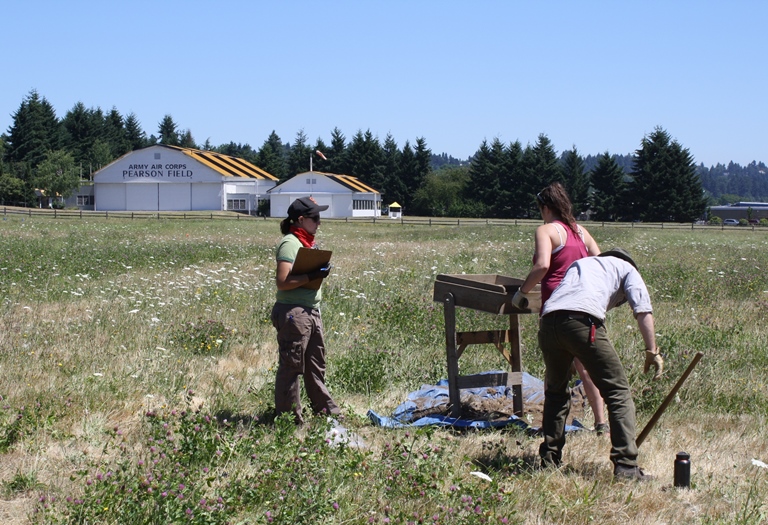|
You are viewing ARCHIVED content published online before January 20, 2025.
Please note that this content is NOT UPDATED, and links may not work. For current information,
visit https://www.nps.gov/aboutus/news/index.htm.

NPS PHOTO
Contact: Katie Wynia, Portland State University Field Director, (360) 816-6250 Contact: Dr. Doug Wilson, Archaeologist, (360) 921-5241 Fort Vancouver National Historic Site invites the public to see archaeology in action this summer at one of the Pacific Northwest's premier archaeological sites. Tuesday through Saturday, June 23 to July 25, from 9:00 am to 4:00 pm, members of the public can visit two excavation sites. Every summer, the National Park Service partners with Portland State University and Washington State University Vancouver for a Public Archaeology Field School. Students in this field school work with National Park Service archaeologists to conduct archaeological excavations throughout the park. This summer, students will be working to the east of the fort stockade, and near the Spruce Mill Trail west of Pearson Air Museum. The excavations will focus on two sites: the Hudson's Bay Company's Cooper's Shop, and the World War I Spruce Mill. Both of these sites represent significant periods in the history of the park. The Hudson's Bay Company's Fort Vancouver, ca. 1825-1860, was the regional headquarters and supply depot for the Hudson's Bay Company. At the Cooper's Shop, coopers made barrels for shipping products, like pickled salmon bound for Hawai'i and furs headed to London. The last known cooper to work in the shop was a Hawaiian employee named Spun Yarn. Students will be testing two dwelling sites suspected to be the housing for the Fort Vancouver coopers. Students will also excavate at the site of the World War I Spruce Mill. The U.S. Army's Spruce Production Division operated the mill from 1917 to 1918 to produce lumber for the Allies' aircraft manufacturing during the war. Students will be testing the main mill, repair and machine shops area, and the bunkhouse/tent city areas of the site. The Spruce Mill played an important role in the development and use of military aircraft. The excavations are part of a continued effort to learn more about the mill's contribution to the war effort. "These sites are symbolic of our past industrial history in the Pacific Northwest," stated Dr. Doug Wilson, Principle Investigator for the project, "The diverse peoples and products of the region are represented in the artifacts and features that will be found this summer." Fort Vancouver Superintendent Tracy Fortmann said, "As we approach the centennial of the United States entering World War I, this research project will allow us to better understand the unique place that the homefront in the Pacific Northwest played in ending the war and changing the face of logging." From 9:00 am to 4:00 pm, Tuesday through Saturday, June 23-July 25 (excluding July 3rd and 4th), both dig sites will be accessible to the public. "We are excited to provide this opportunity for the public to visit the excavations and ask us questions. Archaeology offers us a unique way to connect to history through actual objects that were used in the past," said Katie Wynia, Portland State University Field Director, "The National Park Service is celebrating its centennial year in 2016, and visiting a National Park Service archaeological site offers a great opportunity to find your park at Fort Vancouver NHS."
|
Last updated: June 1, 2015
